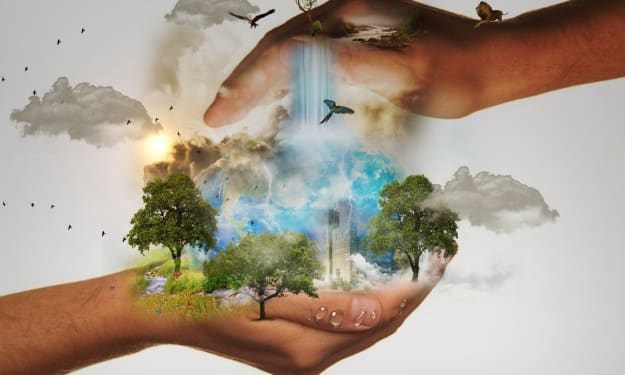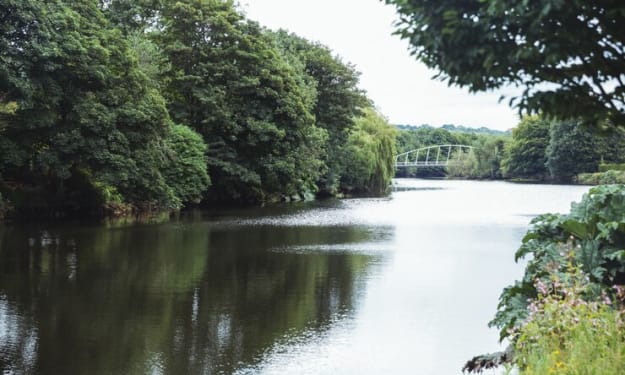What’s the Missing Link in Emotional Intelligence to Address Nature’s Climate Change?
How is it possible that the most intellectual creature to ever walk the planet Earth is destroying its only home? — Jane Goodall

As a teacher, student of nature, and new eco-fiction writer let me try and make a case that emotional intelligence may be a missing link to help bring attention to nature’s climate change.
There is no disagreement that our environment and human communities are impacted in many ways by Nature's erratic and impending climate changes. We hold the planet in our hands and only our action can reverse its acceleration and maintain some normalcy within our biosphere. The main question is how to react to this crisis to retrain our behavior and focus on long term results with simple things we can today with undeniable imagery that doesn’t fade away.
To keep things simple, I will make my case with 2 contenders:
1. Intelligence Quotient (IQ) or how to learn thoughts to understand logic, deductive reasoning, critical thinking and problem solving.
2. Emotional Quotient (EQ) or how to use emotions for self-awareness to guide thinking, adjust and manage environments to achieve one’s goals.
There are so many reports where high IQ's of expertise are needed with backgrounds in biological and engineering sciences that would be helpful. The few scientific literate get it, but as a lay person, how do I begin to understand these various topics of greenhouse effects, cows’ or permafrost methane, advent of green economy, forests’ sequestration and oceans’ carbon sinks, a personal footprint calculator, and ecosystem integrity? What does it mean to limit global warming to less than 2ºC by reducing or capping greenhouse gas emissions?
A recent suggestion noted that the term climate change night be a marketing problem because people don’t have the long-term psychology to relate to the Big Picture over many years of incremental changes. They can deal concretely with personal daily changes and react reasonably but how can they worry about making plans for decades from now?
The dilemma asked recently is how can we surpass intellect and appeal more to personal values to showcase imminent climate change. My suggestion is to embrace emotional experiences to form long term memories but how can we do that?
Think about this: who easily forgets a story that touches your soul or a powerful movie that activates all your senses and leaves forever memory traces.
Teachers know that many concepts (cognitive development) are formed based on our perceptions (visual input), for integrative development of our language and psychology of what is right or wrong and all the inferences in between. The brain is uniquely organized where the emotional relay center (the amygdala) is in the middle that manages all emotions between signals from the back sensory visual cortex to the associative frontal cortex for reasoning and planning.
So, the question needs to be pondered:
How can we stimulate the emotional amygdala to relate to climate changes for long term memory retention and potential to react?
Quickly, here is how I changed my emotional IQ to nature versus cognitive awareness of reading scientific journals. Today, Nature means the world to me as a living process and a friend. I better understand its deepest connections with meaningful respect for its cycles and all citizens and stand ready to challenge any threats of climate change. Seeing a bumblebee in early spring brings instant feelings of joy and belonging.
In the beginning there was a natural affinity raised on a farm within a woods by a creek and marsh where my childhood was filled with sights and sounds of Nature’s incessant activity.
Then I graduated and moved to the city to work where the practicalities of career overtook other different busy directions. Even then, I read articles as many people do, but who had time to worry about species becoming extinct or warmer temperatures as long as our lifestyles remained fairly normal.
Then I retired and returned to my roots in the country to the splendor of my mountain valley when I started my pursuit of writing about nature. More research developed a deeper emotion and basic level of understanding about so many ecosystems, alive and functioning well at four levels of interaction, each particular to its species and surroundings all encompassed by the subject called ecology.
If Nature could have all living things work together, without ego, with adaptations, in great diversity, even democracy, why couldn’t human societies learn same principles to also survive in balance?
This was not a scientific treatise or a lesson plan but a job for imagination to personify Nature as a living Being with feelings, connections, fears and hopes. Nature’s first-person narrative could foster more emotions, to correlate the unexpected with the science and personalize new experiences with the reader. The emotions would undoubtedly beget friendships with fascinating ecological characters each with important roles to play, even if small and insignificant to the human eye.
Perhaps good storytelling with imagination based on science would help children and others to become more curious about the significance of the Big Picture of Nature working within its splendid synergy.
Even better yet, a movie with sights, sounds and music would stimulate the amygdala for many years of thoughtful recollection.
What if a cloud had a story to tell about his initial birth to Father Sun and Mother Ocean, his primary job and how he went rogue, mean and angry?
He tells a simple story about his formation from water vapor molecules within warm temperatures that rose upward into cooler air condensing to form tiny water droplets. "Too much moisture, I'm bursting, watch out for the rain! Not wet enough, I am a wisp on the skyline sadly watching the land dry up below me."
He affirms, "Clouds affect climate and climate affects the clouds."
Imagine floating high with dual purposes to shade the Earth from the sun and trap the sun’s rays from radiating back into space, his voice like a breeze. "Like a blanket at night I insulate the Earth. People call it the greenhouse effect. If only they related more seriously to rising temperatures when massive quantities of carbon dioxide particles such as fossil fuels are released that thicken the blanket."
Then there is air pollution and I cough and sneeze and if temperatures are hot enough, growing into a tremendous storm cloud thundering and shooting lightning bolts. If I pass through a high pressure area I can explode into a hurricane or tornado with unspeakable disasters. I'm sorry that I am so unstable but I have no neural center or will power of my own; just represent consequences of wind and solar temperatures. Those with neural ability should control unnatural effects by congesting the air causing greenhouse higher temperatures."
Float lazily along a coast line watching the shimmering ocean far below.
"My biggest fear is working together with the vast oceans by trying to shade roughly one fifth of their surfaces, reflecting some of the solar radiation back into space thereby helping to keep the Earth's surface cooler.
But lately the sun has hotter temperatures for longer and I’m becoming thinner ... thin enough not to shade the oceans thus adding more to global warming. What if I disappeared?
In conclusion, how do you develop emotional intelligence for cognitive bonding … I believe the missing link may be found in one’s vibrant imagination discovering the wonders of the ecosystem.
Even Albert Einstein once said:
“Imagination is more important than knowledge. For knowledge is limited, whereas imagination embraces the entire world, stimulating progress, giving birth to evolution.”
Do you have any emotional encounters with Nature that you think about again and again that give you peace of mind and reflection?
Annemarie Berukoff
PS: If making a movie, please don't draw a puffy cloud face with Disney google eyes. Make features with lighter and darker shading, please.
About the Creator
Annemarie Berukoff
Experience begets Wisdom: teacher / author 4 e-books / activist re education, family, social media, ecology re eco-fiction, cultural values. Big Picture Lessons are best ways to learn re no missing details. HelpfulMindstreamforChanges.com






Comments
There are no comments for this story
Be the first to respond and start the conversation.